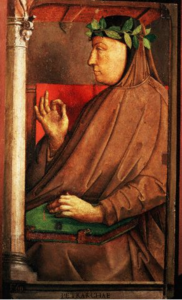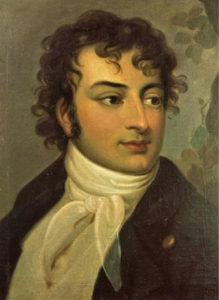Sonnet
(Poet's title: Sonett)
Set by Schubert:
D 628
[November 1818]
Apollo, lebet noch dein hold Verlangen,
Das an thessal’scher Flut die blonden Haare
In dir entflammt, und ist’s im Lauf der Jahre
Nicht unter in Vergessenheit gegangen:
Vor Frost und Nebeln, welche feindlich hangen,
So lang sich uns dein Antlitz birgt, das klare,
Jetzt dies geehrte heil’ge Laub bewahre,
Wo du zuerst und ich dann ward gefangen.
Und durch die Kraft von dem verliebten Hoffen,
Das in der Jugend dich nicht ließ vergehen,
Lass, von dem Druck befreiet, die Luft erwarmen.
So werden wir, vom Staunen froh getroffen,
Im Grünen unsre Herrin sitzen sehn
Und sich beschatten mit den eignen Armen.
Apollo, if there is still life in that beauteous desire
Which arose by the surging waters in Thessaly, her blond hair
Having kindled it, and if, as the years have passed
It has not fallen into oblivion:
Protect from frost and mist (which threaten enmity
For as long as they hide your clear face from us)
This revered, sacred foliage, protect it now,
The place where first you and then I were captured.
And through the power of that beloved hope
Which in youth did not allow you to die,
Let the air warm up, liberated from the icy grasp.
In this way, happily struck by astonishment, we shall
See our Lady sitting in the greenery
Shading herself with her own arms.
All translations into English that appear on this website, unless otherwise stated, are by Malcolm Wren. You are free to use them on condition that you acknowledge Malcolm Wren as the translator and schubertsong.uk as the source. Unless otherwise stated, the comments and essays that appear after the texts and translations are by Malcolm Wren and are © Copyright.
☙
Themes and images in this text:
The ancient world Apollo / Phoebus Arms and embracing Floods and tides Frost and ice Greece Green Hair Hope Laurel Leaves and foliage Mist and fog Shade and shadows The sun
The revered, sacred foliage which Petrarch begs Apollo, the sun god, to protect can only be a laurel tree, since this is where he was first captivated by Laura. However, she cannot have been sitting in its shade, for she had to raise her arms to shade herself (and perhaps to protect herself from the blazing glance of Apollo, who, like Petrarch later, had been taken prisoner by her beauty). We therefore have to imagine the Laurel tree as the background to the scene, with Laura sitting on the grass in the foreground. In the first eight lines (the octave) the poet simply uses the background to set the scene for his hopes for the future, which follow after the volta in line 9. Will it happen again? Will the poet and the sun be granted a further vision of her beauty now that winter is over and the air is warming up?
☙
Schlegel’s translation is remarkably close to Petrarch’s original. He even manages the astonishing feat of keeping the same rhyme scheme (something that is probably technically impossible in English): ABBA ABBA CDE CDE.
Apollo, s’ancor vive il bel desio
Che t’infiammava a le tesaliche onde,
E se non hai l’amate chiome bionde,
Volgendo gli anni, già poste in oblio;
Dal pigro gielo e dal tempo aspro e rio,
Che dura quanto ‘l tuo viso s’asconde,
Difendi or l’onorata e sacra fronde
Ove tu prima e poi fu’ invescato io;
E per vertù de l’amorosa speme
Che ti sostenne ne la vita acerba,
Di queste impression l’aere disgombra.
Sì vedrem poi per meraviglia insieme
Seder la donna nostra sopra l’erba
E far de le sue braccia a sè stessa ombra.
Rime In vita di Madonna Laura, 34
Apollo, if that sweet desire is still alive
that inflamed you by the river of Thessaly,
and if with the passing years you’ve not already
forgotten that beloved blonde hair:
defend the honoured and sacred leaves now,
where you long ago, and I lately, were caught,
through the slow frost and harsh and cruel time
that is endured while you hide your face:
and by the power of that amorous hope
that sustained you, though life was bitter,
disburden the air of this dark weather:
so we may see by a miracle together
our lady seated on the grass
lifting her arms to make herself a shade.
English translation from Italian © A. S. Kline 2002
☙
Original Spelling and note on the text Sonett. X. Apollo, lebet noch dein hold Verlangen, Das an Thessal'scher Flut die blonden Haare In dir entflammt, und ists im Lauf der Jahre Nicht unter in Vergessenheit gegangen: Vor Frost und Nebeln, welche feindlich hangen, So lang' sich uns dein Antlitz birgt, das klare, Jetzt dies geehrte heil'ge Laub bewahre, Wo du zuerst und ich dann ward gefangen. Und durch die Kraft von dem verliebten Hoffen, Das in der Jugend dich nicht ließ vergehen, Laß, von dem Druck befreyt, die Luft erwarmen. So werden wir, vom1 Staunen froh getroffen, Im Grünen uns're Herrin sitzen sehen, Und sich beschatten mit den eignen Armen. 1 Schubert changed Schlegel's 'von' to 'vom'
Confirmed with Francesco Petrarca, Il Canzoniere con le note di Giuseppe Rigutini, rifuse e di molto accresciute da Michele Scherillo. Terza edizione, rinnovata. Ulrico Hoepli, editore libraio della real casa, Milano, 1918, page 151; and with Le Rime di Francesco Petrarca secondo la revisione ultima del poeta a cura di Giuseppe Salvo Cozzo. In Firenze, G. C. Sansoni, editore. 1904, page 36.
Confirmed by Peter Rastl with Schubert’s source, Blumensträusse italiänischer, spanischer und portugiesischer Poesie von August Wilhelm Schlegel. Berlin. In der Realschulbuchhandlung. 1804, page 21.
To see an early edition of the text, go to page 21 [33 von 268] here: http://digital.onb.ac.at/OnbViewer/viewer.faces?doc=ABO_%2BZ167383408



